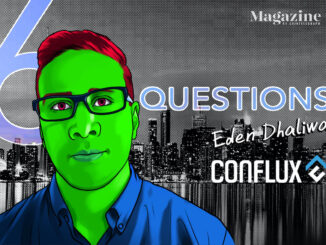
[ad_1]

We ask the buidlers in the blockchain and cryptocurrency sector for their thoughts on the industry… and throw in a few random zingers to keep them on their toes!
This week, our 6 Questions go to Michelle Legge, head of crypto tax education at Koinly — a cryptocurrency tax calculator and portfolio tracker for traders, investors and accountants.
Alongside her work at Koinly, Michelle is passionate about closing the financial literacy gap for women. Before crossing into the crypto space, she looked after consumer education for an Australian fintech startup, where she launched a world-first gender-pay-gap insurance product.
Today, Michelle is back in her homeland of South Africa, living the digital nomad life and managing a remote team of content and social media wizards from plant-based cafes across Cape Town. As for her crypto curiosity, Michelle is cautiously optimistic, betting on altcoins with unconventional use cases. Blame it on her day job, but while Michelle knows that crypto is the future, crypto tax appears to be the dark side of the moon. Helping crypto investors to be tax-strategic seems a worthy cause in light of ever-tightening regulations.
1 — From smart contracts to DApps, NFTs and DeFi, we have seen so many of the next “killer apps” for crypto, but none have really taken off quite yet. What will stick?
Projects that attract the warm embrace of Joe Public are the ones that stick. We’ve gotten a lot closer to a retail use case with DeFi’s many yield farming products, and that shows no signs of slowing down. But will it go fully mainstream? Possibly, in time — provided the space doesn’t get taxed into oblivion. On the other hand, NFTs have seen massive adoption from all walks of life, creating a sense that this blockchain use case has cracked a very tough nut.
While the NFT arena might be dominated by the glitz and glam of the celebrity art scene today, I imagine NFTs will come into their own in a rather mundane way. If the public can interface with “the blockchain” via pictures, then it’s logical to assume that anything we’re used to seeing on paper will go the way of a digitized, ownable NFT. What could this look like at the most basic level? Share certificates, graduation diplomas, medical records, insurance policies, birth certificates, passports, etc.
The creation, distribution and management of proof-of-ownership NFT administration could spawn an industry of its own, much like it already has in the gaming industry. However, for NFTs to work like this, we need to remember that the NFT art we’re just getting our heads around is a taxable asset. That’s fine when we’re thinking about art, music, movies and domain names, but no one wants to face a tax bill for erroneously “profiting” from the “disposal” of a health insurance policy. It will need to be clear to all, the taxman included, that NFTs used in this way have a zero-dollar value.
2 — If the world is getting a new currency, will it be led by CBDCs, a permissionless blockchain like Bitcoin, or a permissioned chain such as Diem?
It pains me to say, but central bank digital currencies are waiting in the wings. Everything we’ve seen, from Biden’s executive order to the much-hyped inflation curse throttling the global economy, tells us that governments are hungry for CBDCs. Even without the regulation headlines, we need only consider the power and control that CBDCs offer. Rishi Sunak’s Britcoin appears in the works, with disturbing undercurrents of programmability — leaning into the likes of China’s social credit system. CBDCs will be, but unlike the disruptive and empowering future presented by Bitcoin and friends, CBDCs seem a different blockchain beast altogether.
3 — Which is sillier: $500,000 Bitcoin or $0 Bitcoin? Why?
Don’t call me negative, but I work in crypto tax. It’s my opinion that the bulk of the Bitcoin “mooning” happened behind the curtains, in the good old days when governments and tax agencies were none the wiser. Can stratospheric growth happen under the iron fist of rampant regulations and scrutiny? I fear not.
4 — Tell us about a hidden talent, and give us a link to prove it!
A talent so hidden it might not even exist? I guess I don’t have “bedroom DJ” in my Twitter bio for nothing, but if being good at Spotify playlists makes me gifted, then so be it. “Le Crush” is the name of my pet playlist, and a homage to my heady nights (perhaps seven in total?) steering the decks in Melbourne’s noughties club scene.
5 — What talent do you lack and wish you had? How would you use it if you had it?
Is it because women are coded for multitasking, or because we live in a high-octane, caffeine-fuelled society? Either way, the talent I lack is the laser-beam focus of a border collie and its tennis ball.
If focus is the house, then the foundation is Buffett’s famous “Say no to almost everything.” The key, it would appear, is to limit open tabs to five max — a great step down from the 39 currently calling my attention. Hyperfocus in a crazy world? I think it’s a talent, or rather a superpower, that most of us wish for.
6 — What’s the silliest conspiracy theory out there… and which one makes you pause for a moment?
This question — and its loaded gun — is just the kind of thing to get a woman canceled! The fact is, I’m rather a reasonable conspiracy theorist, but there’s a spot for a tinfoil hat in my closet, nonetheless.
I think, like many people drawn to cryptocurrency, our sort comes bearing gifts of distrust — and who could blame us? Some of the rabbit hole’s biggest targets — let’s mention Big Pharma here — do have priors. It’s right to question everything, and it’s good to remember that no chapter on WWII is complete without an entry on the Reich Ministry of Public Enlightenment and Propaganda. I will say this though: A flat earth could be a great solution to the rising tides, right?
A wish for the young, ambitious blockchain community:
To the women of blockchain, we need your voices. Be the reason and balance that keeps us moving in the right direction.
[ad_2]
Source link








 Bitcoin
Bitcoin  Ethereum
Ethereum  Tether
Tether  XRP
XRP  Solana
Solana  USDC
USDC  Dogecoin
Dogecoin  Cardano
Cardano  TRON
TRON
Be the first to comment